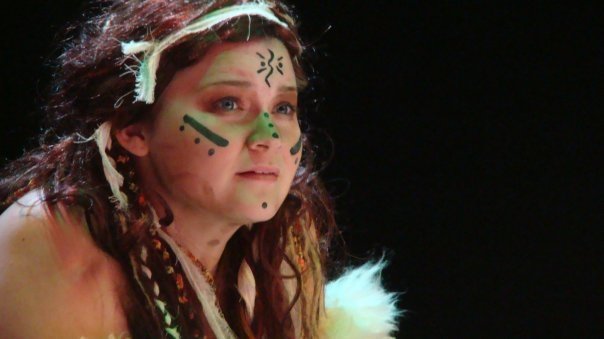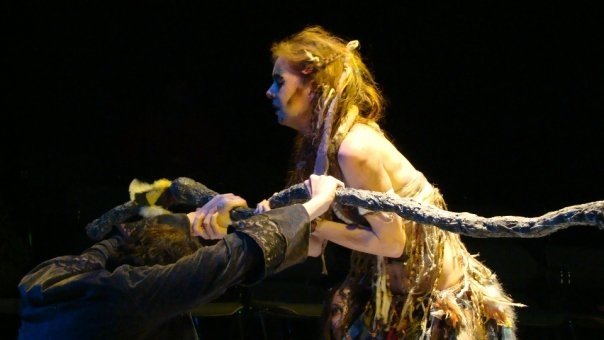Every actor has heard or read some iteration of Stanislavski’s old adage: “There are no small roles, only small actors.” It’s been pounded into the brain of every actor from age 7 to 70 (but mainly to the girl playing the tree in her elementary school production of The Tortoise and the Hare). It’s supposed to make us feel just as important as everyone else in the production. It’s designed to give us a sense of personal responsibility that we apply to another age-old theatre saying: “Act well your part; there all the honor lies.” (Alexander Pope for those taking notes.) And, honestly, it’s to reassure the girl playing the tree that she matters.
I used to hear Stanislavski’s quote constantly. I especially hated hearing it when I was cast as an ensemble member in my high school’s production of Godspell and the lead role I really wanted went to another actor. Now that I’m older, I really wish I could meet my 17-year-old self for coffee, look her in the eye and say, “Hey, I know you hate hearing this, but I’m gonna say it because you need own it: this role does not define your potential. This is a stepping stone.” I did get over it — eventually — because in my second semester of college, a posting came out for auditions for William Shakespeare’s The Tempest. I had three years of Shakespearean training during high school summers, and I was really the only person in my thespian troupe who gravitated toward The Bard. I thought, “This play is it! I’m good at this kind of thing! I’ll get a part!”
And I did.
“Spirit drummer #4.”

Ashleigh Gardner as Spirit Drummer #4. The Tempest at Valencia College, 2009. Photo courtesy of Minas Fakrajian.
You’re probably thinking, “Wait. WHAT! You just got another small role! What is ‘spirit drummer #4′? That’s not even in the script!” And you’re right. She’s not. This character is NOT in Shakespeare’s script. Shakespearean purists might balk at a director adding another character, but this production was creative, daring, visceral educational theatre. (I’m sure Shakespeare would have approved.) Aside from my furrowed brow and general confusion, I was pleased. I was cast. It was really all I was asking for. Rehearsals began the following week.
We did a table read, and even though I and my 3 other spirit drummer cast mates didn’t have any lines, we were there. Our director had us present for every rehearsal thereafter, getting a feel for the show’s tone so that we could effectively provide appropriate sounds and effects for every scene. In addition to being cast as silent characters, we were cast as musicians even though none of us had any percussion training to speak of. Over the course of six weeks, the four drummers went through intense movement training along with the actors who played Ariel and her spirits. We had our own specialized rehearsals to work on the calypso, Caribbean, and African percussion styles that influenced the theming of the show. Our prop master also made all four drummers our own unique set of instruments.
In terms of participation in the action of the show, our characters were the companions to Ariel’s elemental spirits: Earth, Water, Fire, and Air. My drummer’s elemental spirit was Air, and that actor and I worked together to create the sounds that would represent her character. Her footsteps were light, so I hit the rim of the drum in varying speeds and rhythms to mimic her movement. For scenes that required a “score” for the action occurring onstage, the four drummers would provide a low beat that escalated or fell in speed and intensity depending on the mood. However, our connection to the show wasn’t limited to the outskirts. During Ferdinand and Miranda’s marriage, the drummers were part of the ceremony; we danced along with Ariel and her spirits, and we played our instruments feverishly, celebrating the union of the play’s youngest characters. And like Ariel and her spirits, our characters were bound by Prospero’s spell. (We had airbrushed tattoos on our ankles and wrists that represented our magical imprisonment.) We were under his control, and in the final scene of the show, he set all of us free in a symbolic ceremony. We exited the island, and the play ended with Prospero reflecting on his life in complete silence.

Roger Floyd as Prospero and Samantha Faith O’Hare as Ariel. The Tempest at Valencia College, 2009. Photo courtesy of Minas Fakrajian.
There were times when I thought, “I’m made up. My character doesn’t even exist. This story exists without me.” And that’s true. The Tempest is a tried and true piece of theatre. There are no “spirit drummers” in Shakespeare’s script. It never called for Caribbean percussion. Without “spirit drummers” at the Globe theatre on November 1, 1611, the show opened and played to audiences. The Tempest has been done hundreds – if not thousands – of times prior to 2009. However, our particular production had never been done before. This was special. My character was special to this production.
I realized, after weeks of character development and rehearsals, that I mattered. The actor playing my Air spirit needed her musical introduction during the hurricane in the opening scene. Particular moments in the show needed a certain sound that only my drum could provide. I also equaled out the ratio of female drummers to male drummers, giving our small drum circle an evenness of look and energy. Aside from seeing my own worth in that role, I came to understand that, as an actor, I was a small piece of a larger puzzle. Even though I was a vital part of the production, I was not the only character. Every role made that particular production what it was, from the Prospero to the Caliban, the Sebastian to the Trinculo, the Ariel to the spirit drummers.
You are needed for the production in which you are cast.
In theatre, you cannot help if you are cast as a tertiary role, but you can help how much effort you put into making your character more than a name on a page. Your character is your responsibility. You were chosen for a specific reason, even if that reason is not obvious. Let me repeat: your character is not just a name on paper; your character is what you make of them. Don’t drop out because you feel like your talent “isn’t appreciated.” If your talent wasn’t appreciated, you wouldn’t have been cast at all.
“There are no small parts, only small actors.”
“Act well your part; there all the honor lies.”
Actors usually never realize the weight of these adages until later in life. I know I didn’t. In high school, I was caught up in chaotic personal discovery, and that meant a lot of natural self-centeredness when it came to productions. I felt helpless against a seemingly endless sea of ensemble roles. My heart ran the whole gamut of negative emotions when I wasn’t cast in the role I wanted: vanity, pride, jealousy. But when I saw how creative I could be with my ensemble character, I began to look at ensemble roles differently. In time, vanity turned into a healthy awareness of physical and emotional self; pride transformed into a belief in positive self-worth; jealousy became a desire to educate and better my craft.
Alexander Pope doesn’t say, “Act well your lead part.” He says, “Act well your part.” Period. When Stanislavski says, “There are no small parts, only small actors,” he’s not minimizing a child’s emotional response to being cast as a tree. He’s elevating her self-worth. He’s pushing her to dig just as deep into her character as the boy playing the tortoise. He’s telling the girl who read “Tree” next to her name that, without her, there would be no forest – but also that she is not the only role that matters. She is part of a group of people who depend upon each other for a smooth and successful production. His words are a message of encouragement, but also of humility. When we finally find that delicate balance between pride and selflessness, we realize that we are part of something greater than ourselves: the theatre.
The video below is of a blocking rehearsal/safety call two weeks prior to opening night. This is the opening scene in which Alonsa (Alonso in the original script) and her companions are caught in Prospero’s tempest. They are surrounded by Ariel’s spirits and scattered by them during the storm. The drumming heard in the background is live. (Video by Amber Leigh Farish.)
William Shakespeare’s The Tempest was produced in 2009 at Valencia College. It was directed by John Didonna with lighting design by Sonia Pasqual, prop design by Kristen Abel, and costume design by Mary Salvia.

